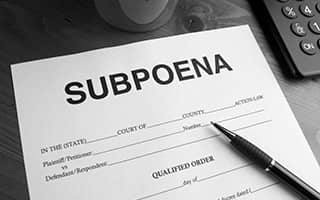Instant Court Case Lookup
The following is for information purposes only
Table of Contents
Subpoenas

A subpoena is a formal legal order requiring a person or entity to appear in court or produce documents, records, or other evidence relevant to a legal proceeding. Its primary purpose is to ensure that courts and investigative bodies have access to necessary information, facilitating fair adjudication in both civil and criminal cases.
Subpoenas can be issued by judges, courts, or attorneys, depending on the jurisdiction and the type of case. At the federal level, civil subpoenas derive from Rule 45 of the Federal Rules of Civil Procedure. State courts and local jurisdictions provide analogous authority under state procedural laws. Additionally, federal and state administrative agencies such as the SEC, IRS, and DOJ may issue subpoenas during investigations, subject to statutory and constitutional limits.
The legal foundation of subpoenas is rooted in the Sixth Amendment, which ensures access to witnesses in criminal trials, and the Fifth Amendment, which protects against unreasonable demands and ensures due process is followed.
Types of Subpoenas
There are several types of subpoenas, each designed to secure specific forms of evidence or testimony for a court or investigative process:
-
Subpoena ad testificandum: This subpoena compels an individual to appear and provide sworn testimony before a judge, grand jury, or administrative body. It is widely used in both civil and criminal matters to ensure that critical witnesses appear in person. Non-compliance may lead to contempt sanctions or court-ordered enforcement.
-
Subpoena duces tecum: A subpoena duces tecum requires the production of documents, digital records, or physical evidence. Recipients may include individuals, corporations, healthcare providers, or government agencies. Common targets include financial statements, correspondence, contracts, photographs, or electronic data. This tool is central to civil discovery and investigative inquiries.
-
Administrative and Grand Jury Subpoenas: Administrative subpoenas are issued directly by regulatory or investigative agencies such as the IRS, SEC, and DOJ, under authority, typically without prior judicial approval. They must relate to matters within the agency's jurisdiction. Grand jury subpoenas operate within criminal investigations, compelling testimony or evidence in confidential proceedings that support potential indictments.
-
Civil vs. Criminal Subpoenas: Civil subpoenas help private parties gather evidence and follow procedures focused on providing notice and ensuring fairness. Criminal subpoenas, issued by prosecutors or defense attorneys, must meet stricter constitutional standards, especially concerning due process, privilege, and protections against self-incrimination.
How Subpoenas Are Issued
Subpoenas may be issued by a judge, court clerk, attorneys, parties authorized by the court, or government agencies acting under statutory authority.
To obtain a subpoena, a party typically submits a request through the court, specifying the testimony or document sought and demonstrating relevance. Under the Federal Rules of Civil Procedure, Rule 45, attorneys may issue subpoenas on behalf of the court, while states follow similar procedures with localized variations.
In administrative investigations, such as those conducted by the SEC, IRS, or DOJ, agencies may issue subpoenas directly under their statutory authority, bypassing traditional court approval.
Service of Subpoenas
Subpoenas must be properly served to be legally enforceable. Acceptable methods of serving subpoenas include personal delivery, certified mail, and, in some jurisdictions, electronic service.
When authorized by the court, individuals are generally served via a personal service, while organizations may be served through registered agents or corporate officers. For interstate matters, the Uniform Interstate Depositions and Discovery Act (UIDDA) streamlines service by allowing a subpoena to be domesticated and served based on the receiving state's procedural rules.
Compliance and Response
Recipients of a subpoena have a legal duty to comply by appearing or producing the requested documents within the designated timeframe, usually 10-30 days, depending on the jurisdiction and case type. Recipients of a subpoena may assert their legal rights by filing written objections or a motion to quash or modify if the subpoena is unreasonable or improper.
Subpoenas cannot force disclosure of privileged confidential materials, such as attorney-client communications, work product, medical records, or trade secrets, without strict safeguards. Therefore, recipients may withhold protected content. Access to confidential materials requires submitting a privilege log.
Failure to Comply with a Subpoena
Failure to comply with a subpoena can result in contempt of court, fines, or even arrest. Courts may enforce compliance through motions to compel, issuing orders that mandate timely compliance.
Recipients of a subpoena can challenge improper or overly broad subpoenas by filing motions to quash or modify, asserting undue burden, lack of relevance, or privilege protections. Legal defenses and negotiated resolutions are often available to address enforcement disputes efficiently.
Subpoenas in Civil vs. Criminal Cases
Subpoenas operate differently in civil and criminal cases. In civil matters, subpoenas are primarily discovery tools, compelling testimony or documents from parties and third parties, while courts may limit or modify them to prevent undue burden. In criminal cases, subpoenas support both the prosecution and the defense, enabling the collection of evidence and the presentation of witness testimony in accordance with the Sixth Amendment.
Constitutional safeguards, such as the Fourth Amendment's protection against unreasonable searches and the Fifth Amendment's protection against self-incrimination, ensure that subpoenas are not abused and respect individual rights.
Subpoenas and Digital Evidence
Subpoenas increasingly target digital evidence, including emails, phone records, and cloud-stored data, reflecting the shift of information into electronic formats. Service providers, technology companies, and ISPs are typically required to comply with subpoenas, providing requested records while managing complex legal obligations.
Compliance must balance the request with privacy protections under federal laws such as the Electronic Communications Privacy Act (ECPA) and, where applicable, HIPAA for medical information. Courts may review subpoenas to ensure they are specific, necessary, and not overly intrusive, safeguarding individuals' digital privacy, while enabling legitimate legal investigations.
Public Access to Subpoena Records

Subpoena records typically contain the subpoena itself, as well as any related filings such as motions, objections, and court orders related to its enforcement, modification, or quashing. They may also contain proof of service, compliance certifications, and docket entries reflecting hearings or enforcement actions. Together, it provides a structured view of how the subpoena was handled within the legal process.
Public vs. Sealed Records
Most subpoena records in civil and criminal cases are publicly accessible unless restricted by law or court order. However, some categories of subpoena records, such as grand jury proceedings, juvenile matters, and cases involving sensitive personal or medical data, are automatically sealed or redacted. Access to confidential records is typically limited to authorized persons to protect confidentiality.
Courts may also seal records when disclosure could compromise investigations or privacy rights.
How to Access Subpoena Records
Subpoena records can be accessed online through Public Access to Court Electronic Records (PACER) for federal cases or through state court websites and trusted third-party platforms for state-level records. These databases typically let users search for subpoena records by case number, party name, or the date the document was filed.
Offline access to subpoena records is available through county clerk offices or court records departments. Individuals may typically request physical files, certified copies, or docket printouts. The courts may require a valid government-issued identification to retrieve the record. Additionally, access to the documents requires fees for searches, printing, or certification.
How to Challenge or Quash a Subpoena
Recipients of a subpoena can challenge or seek modification through a motion to quash or modify, filed in the issuing court or the jurisdiction where compliance is required. The typical grounds for challenging a subpoena include:
-
Lack of relevance.
-
Undue burden.
-
Attempts to compel privileged or protected information, such as attorney-client communications or medical records.
Courts review these motions and may issue protective orders, narrow the scope of the subpoena, or adjust deadlines. This process helps balance the need for evidence with privacy and fairness, ensuring that subpoenas are not used to harass or overreach recipients.
Subpoenas, Summonses, Warrants, and Court Orders
Subpoenas are distinct yet related to other judicial tools, including summonses, warrants, and court orders. Unlike a summons, which requires a party to appear in court, or a warrant, which authorizes law enforcement action, a subpoena specifically demands testimony or the production of documents. Courts may mandate broader compliance, but subpoenas are governed by procedural rules emphasizing notice and fairness.
Within discovery, subpoenas allow parties to gather information from third parties while still operating under the rules of relevance, proportionality, and privilege. In both civil and criminal litigation, subpoenas intersect with discovery rules, enabling parties to obtain relevant evidence while respecting confidentiality and privilege protections.
Frequently Asked Questions
Here are answers to questions frequently asked about subpoenas.
How can I verify if a subpoena I received is genuine or a scam?
You can verify the authenticity of a subpoena you receive by checking the court caption, case number, issuing court, party names, deadlines, and signature. Also, verify the subpoena directly with the issuing court clerk using their official contact information, rather than relying on the details provided on the document.
Do I need a lawyer if I receive a subpoena, and how quickly should I contact one?
Yes. Contact an attorney promptly to review the subpoena, especially if the records contain sensitive information, are voluminous, or may be incriminating. Attorneys may help preserve evidence, assert privileges, or assist in filing a motion to narrow or quash the subpoena.
Can I be subpoenaed if I live in another state or outside the United States?
Yes. If you live in another state, domestic enforcement uses UIDDA or local procedures. For foreign residents, international enforcement requires treaties, comity, or foreign service rules.
Who pays the costs of complying with a subpoena (copying, staff time, expert time)?
Usually, the party responding to the subpoena bears the cost of compliance. However, courts may require cost-shifting in cases involving extensive electronic data discovery or when the cost of compliance would be unduly burdensome for non-parties.
Can I be compensated for appearing as a subpoenaed witness?
Yes. In most states, subpoenaed witnesses are usually provided with statutory witness fees and mileage. Additionally, expert witnesses and other specialized professionals may also negotiate reasonable compensation, as permitted by court rules.
What should I do if a subpoena conflicts with my work schedule or medical needs?
If the subpoenas conflict with your work schedule or medical needs, contact the attorney who issued the subpoena or your own lawyer immediately to request rescheduling or accommodation. Additionally, you may seek to modify the subpoena.
How are subpoenas served on social media or tech companies for digital evidence?
Subpoenas are generally served on the provider's legal department or registered agent according to the company's rules, which must adhere to federal statutes, including the Stored Communications Act, which restricts disclosure of specific content.
Can a subpoena require disclosure of text messages, emails, or social media chats?
Yes, especially if they are relevant and properly scoped. Providers and recipients can raise objections if the subpoena requests are overly broad, involve privileged content, or conflict with privacy law.
How do subpoenas interact with HIPAA and medical privacy laws?
Medical records may only be accessible if the subpoena complies with HIPAA requirements, such as patient authorization, specific assurances, or a qualified protective order. Providers must verify compliance.
Can a subpoena override confidentiality agreements or NDAs?
Usually, yes. A valid subpoena can compel disclosure even when a private confidentiality agreement exists. However, the responding party should notify anyone affected and may request a protective order to ensure that the information is used only under court-approved conditions.